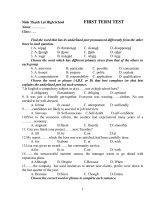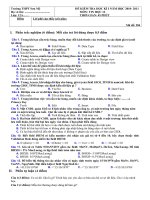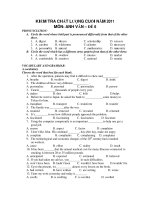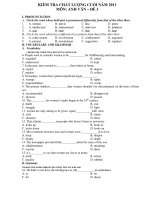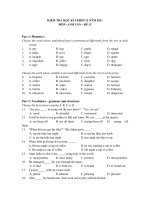KIỂM TRA HỌC KÌ I KHỐI 12 NĂM 2011 MÔN: ANH VĂN – ĐỀ 13 docx
Bạn đang xem bản rút gọn của tài liệu. Xem và tải ngay bản đầy đủ của tài liệu tại đây (68.26 KB, 5 trang )
KIỂM TRA HỌC KÌ I KHỐI 12 NĂM 2011
MÔN: ANH VĂN – ĐỀ 13
Part 1: Phonetics:
Choose the word whose underlined part is pronounced differently from the rest in each
group
1. A. cheap B. champagne C. chain D. choose
2. A. bill B. fill C. fridge D. live
3. A. television B. sugar C. silence D. conversation
4. A. profession B. picture C. special D. information
5. A. amuse B. bush C. tube D. cure
Choose the word whose syllable is stressed differently from the rest in each group
6. A. carry B. prefer C. husband D. logic
7. A. museum B. motorbike C. labourer D. photograph
8. A. lunchtime B. grammar C. mountain D. machine
9. A. pregnant B. mirror C. weather D. perhaps
10. A. Japanese B. Italian C. American D. Cambodia
Part 2: Vocabulary - grammar and structures
Choose the best answer among A, B, C or D
11. The electric light was invented in_______
A. the nineteenth century B. nineteen centuries
C. nineteen century D. century the nineteenth
12. It is very rule to point_______ someone in many cultures.
A. at B. to C. into D. off
13. If our plans are carried_______ now, we will solve that issue
A. out B. up C. upon D. through
14. The neighbours didn't go on vacation, _______?
A. didn’t they B. did it C. did they D. didn't it
15. It_______ the day before yesterday.
A. snowed B. was snow C. has snowed D. was snowed
16. Have you ever_______ on a horse? It is a wonderful experience.
A. rode B. rid C. to ride D. ridden
17. "Where is the library?" "It's_______ your right".
A. in B. on C. at D. by
18. "How many products did you sell?" "_______than we had expected".
A. Less B. Lesser C. Few D. Fewer
19. It's not an easy task. However, please have him_______ it.
A. do B. to do C. doing D. have to do
20. I would like to apply_______ the position of sales clerk that you advertised in the
Sunday newspaper.
A. for B. to C. with D. in
21. It's often difficult for a young child_______ clothes.
A. wearing B. to wear C. putting on D. to put on
22. This knife is quite sharp. We use it_______
A. for to cut the bread B. to cut with the bread
C. cutting with the bread D. to cut the bread
23. I could have done it for you if you_______
A. ask to me to B. asked me to C. had asked me D. had asked me
to
24. Joe_______
A. likes football best B. likes best football
C. best likes football D. likes play football best
25. My sister went_______ yesterday.
A. to shopping B. shopping C. to shop D. shopped
Which sentence expresses the same idea as the given one?
26. We stayed in that hotel despite the noise
A. Despite the hotel was noisy, we stayed there.
B. We stayed in that noisy hotel and we enjoyed it.
C. Although that hotel was noisy, we stayed there.
D. Because of the noise we stayed in that hotel
27. I was astonished that she didn't passed her exam.
A. That she didn't pass the exam astonished me.
B. I was astonished that her exam was not over.
C. I was astonished that she passed her exam.
D. She didn't passed her exam, which astonished her.
28. She hasn't played the piano for five years.
A. The last time she played the piano five years ago.
B. She played the piano five years ago.
C. The last time she played the piano was five years ago.
D. She doesn't play piano five years ago.
29. He lost his job five months ago
A. It has been three months since he has lost his job.
B. it is three months since he lost his job.
C. They are three months since he lost his job.
D. It is three months ago since he lost his job.
30. When they arrived all the good seats were already taken.
A. They didn't get good seats because they arrived too late.
B. They arrived early enough to get good seats.
C. They had to stand for the whole show.
D. They didn't get good seats although they arrived early.
Choose a word or phrase in each sentence that needs correcting
31. I (A) must ask you (B) to stop to make all these plans before (D) I have seen them.
32. I have absolutely (A) no ideal why he wants to (B) leave home and (C) work in (D)
another country.
33. (A) Time runs out and you will (B) have to make (C) a decision in the next (D) few
days.
34. I really (A) don't mind at all (B) because the choice is (C) yours and you can do (D)
which you like.
35. (A) You going to the club this evening or (B) do you want (C) to stay at home and
(D) watch TV?
Part 3: Reading
Read the passages below and choose the correct answer among A, B, C or D.
COMMUNICATIONS
Many years ago, near the beginning of this century, when the may or of Boston
was shown a telephone for the first time, he was so impressed that he declared: "In fifty
years there will be one of these in every American city!".
Others predicted that the telephone would make writing, to friends at least,
unnecessary because instant person-to-person communication would be possible.
Typically, they also predicted the end of postal services altogether and the death of the
skill of letter writing. The advantages of the telephone over sending a letter were so
obvious, it was felt, that nothing could stop this process.
Both these predictions proved to be wrong in their own ways, of course, but there
is no doubt that our habits did change with the arrival of the telephone and will change
again as new media come into use.
On the plus side, the telephone has two obvious advantages. Firstly, it frees us from
the difficulties of writing formal letters. We wouldn't have to remember when to use
"Dear Sir", and when to finish with "Yours sincerely", "Yours faithfully" or "Yours
truly", where to put the address and date or to learn all the other rules of formal letter
writing.
Secondly, the telephone allowed us to get our message across in real time, without
having to wait days, and, in the case of some international mail, weeks, for a reply.
Simultaneously, then, the telephone freed us from restrictions of both style and
time. However, the use of the telephone also has disadvantages and there are many times
when writing a letter is preferable to making a call.
In the first place, a telephone call is almost always disturbing. The ringing of the
telephone always interrupts something, even if it is a welcome interruption, so almost all
calls begin rather apologetically.
Letters from friends, on the other hand, are almost always welcome and can't
interrupt anything because we can read them when we choose to read them and respond if
and when we like. Unlike telephone conversations, too, we can also re-read them of
course and choose not to respond at all if we don't want to. In addition, when writing a
letter, you can organize your thoughts more carefully and say what you really want to say
without having to "think on your feet" and running the risk of saying the wrong thing.
In addition to the phone and the postal service now, of course, we have electronic
mail- e-mail - which seems to combine the advantages of both letter writing and using the
telephone.
We can compose e-mail - which seems to combine the advantages of both letter
writing and using the telephone.
We can compose e-mail messages cautiously and slowly, making sure that we
choose our words with care and we can read and re-read them just as carefully before
responding. In these ways, sending an e-mail message is just like sending a letter but
even easier because we can use much less formal language and we don't have to buy a
stamp or leave the house to post it. However, unlike old-fashioned letters, e-mail
messages are usually delivered virtually instantly, just like using the telephone.
36. The mayor of Boston's prediction was wrong because he thought.
A. that letter-writing would die out
B. the telephone would be very fast to spread
C. there would be more telephones than there are.
D. that telephones would not be in private homes.
37. One disadvantage of writing formal letters is that
A. we need to buy a stamp for them B. we can't really get our message
across
C. they are very slow
D. we have to remember lots of rules about how to write them
38. Telephone are disturbing because.
A. we don’t know when they are going to ring
B. they always ring unexpectedly
C. we have to apologise when we speak.
D. they always interrupt something.
39. Letters are sometimes better than making telephone calls because.
A. we don’t have to think quickly B. we have to respond carefully
C. they are more carefully written D. they are always welcome
40. Sending an e-mail message if
A. easier than writing a letter B. quicker than telephoning
C. just the same as writing a letter D. quicker than writing a letter
What kind of music do you enjoy? Some people like going to (41)_______
converts, and listening to (42)_______. The musicians wear very formal clothes, and the
(43)_______ is silent until the end of the (44)_______. Perhaps you are a rock music
(45)_______. Rock concerts are often held at football (46)_______ or in parks. Members
of the audience dance to the music, or sing the songs (47)_______ music is played at
weddings and parties in many countries, and some people (48)_______ their own music
at home. Nowadays we (49)_______ music in shops and lifts, and many people carry
their own music with them, or even (50)_______ to music when they study. Music is
everywhere!
41. A. classic B. classics C. classical D. classified
42. A. an orchestra B. a group C. a band D. a record
43. A. spectators B. people C. guests D. audience
44. A. happening B. performance C. music D. action
45. A. fan B. enthusiasm C. reader D. friend
46. A. matches B. grounds C. pitches D. pools
47. A. Historical B. Nation C. Traditional D. Ancient
48. A. do B. get C. make D. take
49. A. understand B. hear C. perform D. listen
50. A. hear B. have C. follow D. listen
1. B 2. D 3. A 4. B 5. B 6. B 7. A 8. D 9. D 10. A
11. A 12. A 13. A 14. C 15. A 16. D 17. B 18. D 19. A 20. A
21. D 22. D 23. D 24. A 25. B 26. C 27. A 28. C 29. B 30. A
31. D 32. A 33. A 34. D 35. A 36. D 37. D 38. D 39. A 40. A
41. C 42. A 43. D 44. B 45. A 46. B 47. C 48. C 49. B 50. D
